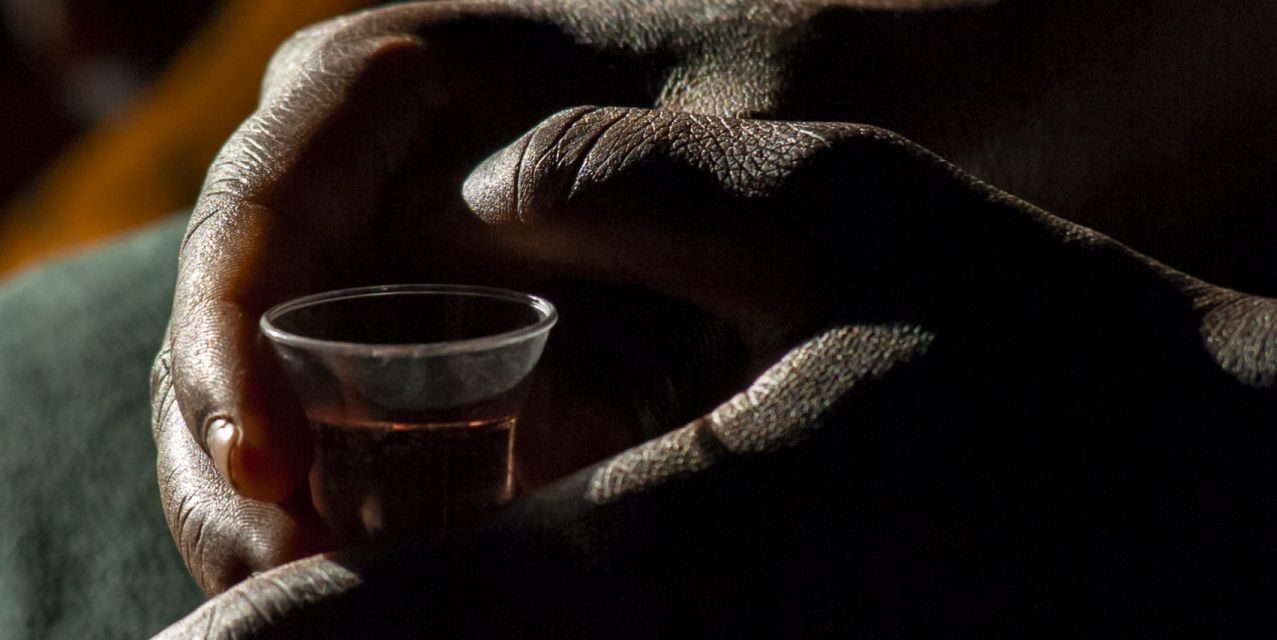Above: A new Nigerian believer prepares to take the Lord’s Supper. (IMB photo)
NORTHEAST NIGERIA(BP) – Watching Boko Haram behead her Christian father and leave her brother for dead in their Nigerian village has strengthened the faith of Manga, who practices Christianity in the deadliest nation for believers.
Manga told her story to persecution watchdog Open Doors two months after the U.S. State Department dropped Nigeria’s designation as a Country of Particular Concern, a designation that can draw economic sanctions from the U.S. government.
“Once you are Christian in Nigeria, your life is always at stake. Especially in the northeastern part of Nigeria, most dominant, most populated are the Muslims. The Christians are the minorities.” Manga told Open Doors, which released soundbites and a transcript of the interview Wednesday, Jan. 19. “As shocking as it may look when we were attacked, we were not surprised, because we know it boils down to the fact that we are Christians.
Nearly a decade after her father’s death, Manga describes herself as a stronger Christian who practices her faith publicly amid increasing danger.
“After the attack, the way I practice, the way I worshiped changed. It gives me the resilience to practice (faith) more, to worship all the more,” Manga said. “We prayed the more. We seek the face of God the more. And the Holy Spirit is always there to encourage us.”
Nigeria was home to nearly 80 percent of the 5,898 Christians killed for their faith globally in 2021, accounting for 4,650 deaths at the hands of Boko Haram, the Islamic State West Africa Province (ISWAP) and Fulani Militants, according to Open Doors’ research.
Open Doors CEO and President David Curry blames politics for the U.S. losing its focus on Nigeria. Open Doors characterizes Nigeria as not only the deadliest country for Christians, but on its 2022 World Watch List, it ranks Nigeria as the seventh most dangerous country overall for Christians, based on a combination of various factors including governmental and societal persecution.
“There’s no rational reason why it was dropped, except some people in the State Department were playing politics,” Curry said. “I think it seems on its face pretty political that the justification is the country, the government itself is not doing that, so therefore we’re going to drop them. Of course that’s not a defensible position here.
“Nigeria has the ability and the responsibility to protect its civil society. These are churches. They are entire cities and villages which are being overrun by these Islamic extremists, and the government of Nigeria is doing little or nothing about it, year after year,” Curry said. “And now, millions of people have had to move to the South or been dislocated since 2014. You have millions of people who want to stay in their homes, but they continue to be bombarded.”
Nigeria fails to invest the proper weaponry and manpower in fighting terrorism against Christian communities, Curry said. Nearly half of Nigeria’s 211.4 million people, or 98 million, are Christian.
Manga’s father was among the earliest victims of Boko Haram in northeastern Nigeria in 2012.
Illia Djadi, Open Doors senior analyst for freedom of religion and belief for Sub-Saharan Africa, said Nigerian President Muhammadu Buhari has not kept his 2015 campaign pledge to eradicate Boko Haram.
“Boko Haram is still capable to operate, to carry out deadly attacks, targeting military positions, but also civilians,” Djadi said. “The main issue, the big issue in Nigeria today is security. Security has become the number one issue in this country, because in addition to the Boko Haram insurgency affecting the northeastern province of, or states of, Borno state, Adamawa state, and the Yobe state. Now, we have seen an explosion of that violence.
“It’s not only Boko Haram insurgency, but there is also a criminal gang operating in north central Nigeria, northwestern Nigeria. But also we have these Fulani militants, insurgency or activity affecting the central state, predominantly Christian state in the middle belt of Nigeria.”
Nigeria had only been designated a U.S. State Department County of Particular Concern since 2020 before it was dropped in November. Curry expressed hopes that the country will be returned to the State Department’s list.
Manga wants the world to know what is happening to Christians like herself in Nigeria.
“People around the world and the United States, it’s important to know what is happening to Christians in Nigeria, because we are all part of one body. We’re part of Christ’s body,” Manga said. “And when one part of Christ’s body is affected with a situation, it’s important that the whole body of Christ are aware, so that they could join us in prayers and however possible to assist. Because the Scriptures say, ‘Iron sharpens iron’ (Prov. 27:17).”





